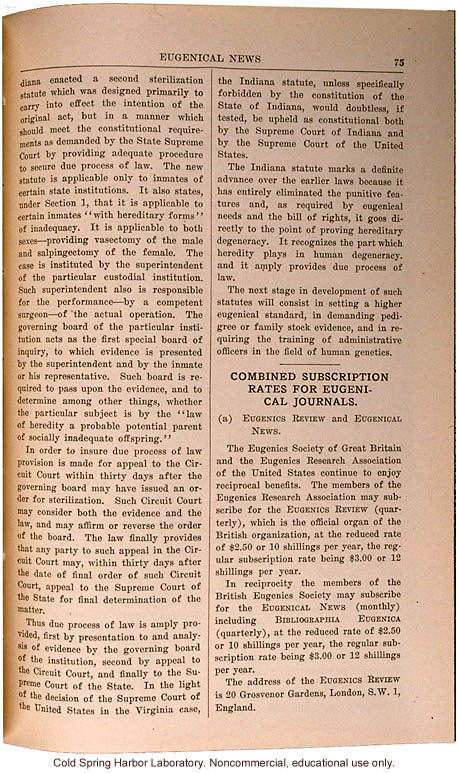"The Second Indiana Sterilization Law," Eugenical News (vol. 15) (1)

"The Second Indiana Sterilization Law," Eugenical News (vol. 15) (1)
1890. Eugenical News 75 diana enacted a second sterilization statute which was designed primarily to carry into effect the intention of the original act, but in a manner which should meet the constitutional requirements as demanded by the State Supreme Court by providing adequate procedure to secure due process of law. The new statute is applicable only to inmates of certain state institutions. It also states, under Section 1, that it is applicable to certain inmates "with hereditary forms" of inadequacy. It is applicable to both sexes - providing vasectomy of the male and salpingectomy of the female. The case is instituted by the superintendent of the particular custodial institution. Such superintendent also is responsible for the performance - by a competent surgeon of the actual operation. The governing board of the particular institution acts as the first special board of inquiry, to which evidence is presented by the superintendent and by the inmate or his representative. Such board is required to pass upon the evidence, and to determine among other things, whether the particular subject is by the "law of heredity a probably potential parent of socially inadequate offspring." In order to insure due process of law provision is made for appeal to the Circuit Court within thirty days after the governing board may have issued an order for sterilization. Such Circuit Court may consider both the evidence and the law, and may affirm or reverse the order of the board. The law finally provides that any party to such appeal in the Circuit Court may, within thirty days after the date of final order of such Circuit Court, may appeal to the Supreme Court of the State for final determination of the matter. Thus due process of law is amply provided, first by presentation to and analysis of evidence by the governing board of the institution, second by appeal to the Circuit Court, and finally to the Supreme Court of the State. In the light of the decision of the Supreme Court of the United States in the Virginia case, the Indiana statute, unless specifically forbidden by the constitution of the State of Indiana, would doubtless, if tested, be upheld as constitutional both by the Supreme Court of Indiana and by the Supreme Court of the United States. The Indiana statute marks a definite advance over the earlier laws because it has entirely eliminated the punitive features and, as required by eugenical needs and the bill of rights, it goes directly to the point proving hereditary degeneracy. It recognizes the part which heredity plays in human degeneracy, and it amply provides due process of law. The next stage in development of such statutes will consist in setting a higher eugenical standard, in demanding pedigree or family stock evidence, and in requiring the training of administrative officers in the field of human genetics. [centered score] Combined Subscription Rates for Eugenical Journals. (a) Eugenics Review and Eugenical News. The Eugenics Society of Great Britain and the Eugenics Research Association of the United States continue to enjoy reciprocal benefits. The members of the Eugenics Research Association may subscribe for the Eugenics Review (quarterly), which is the official organ of the British organization, at the reduced rate of $2.50 or 10 shillings per years, the regular subscription rate being $3.00 or 12 shillings per year. In reciprocity the members of the British Eugenics Society may subscribe for the Eugenical News (monthly) including Bibliographica Eugenica (quarterly), at the reduced rate of $2.50 or 10 shillings per year, the regular subscription rate being $3.00 or 12 shillings per year. The address of the Eugenics Review is 20 Grosvenor Gardens, London, S. W. 1, England. [end]
- ID: 11805
- Source: DNALC.EA


